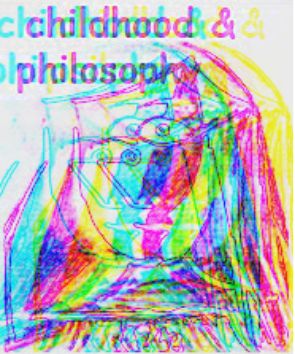"a antropologia da infância chegou para ficar": entrevista com david lancy
DOI:
https://doi.org/10.12957/childphilo.2024.82578Palavras-chave:
antropologia da infância, agência, parentalidade, educação, povos origináriosResumo
O texto discute a consolidação do campo da antropologia da infância a partir de um diálogo com David Lancy, professor emérito de antropologia na Universidade do Estado de Utah, Estados Unidos, e uma das figuras-chave da institucionalização do campo naquele país. A partir de uma entrevista com Lancy na ocasião do lançamento da terceira edição de seu livro The Anthropology of Childhood, apresentamos as principais contribuições deste autor a um público lusófono e discutimos temas chave para os estudos da infância, como os usos da noção de agência, bebês, a variabilidade cultural das categorias de idade, além da contribuição da antropologia para as pesquisas sobre infância, parentalidade e educação. Para Lancy, a antropologia da infância dá visibilidade a compreensões alternativas, em relação à psicologia do desenvolvimento infantil, sobre a infância e sobre processos de aprendizagem, trazendo novas questões e novas perspectivas. Com base num amplo levantamento de pesquisas etnográficas, o autor afirma a significativa quantidade de registros feitos por antropólogos sobre as vidas de crianças em diferentes culturas, enfatizando as distinções entre, de um lado, as infâncias de povos originários e tradicionais e, de um outro lado, infâncias ocidentais e urbanas, que ele sugere agrupar, seguindo uma denominação cada vez mais frequente nos Estados Unidos, como sociedades “WEIRD” [extraño], um acrônimo para “Western, Educated, Industrialized, Rich and Democratic Societies”. Nesta entrevista, Lancy ressalta que os trabalhos antropológicos sobre infância em povos originários ou povos tradicionais, quando bem conduzidos, possuem o potencial de produzir um efeito de grande respeito e legitimidade às formas de pensar sobre a infância e educação desses povos.
Downloads
Referências
ALANEN, L. (2001). "Explanations in generational analysis". In L. Alanen & B. Mayall (Eds.), Conceptualizing Child–Adult Relations. London: Routledge, pp. 11–22.
BELLIER, I., Cloud, L., & Lacroix, L. (2017). Les droits des peuples autochtones. Des Nations Unies aux sociétés locales. Paris: L'Harmanttan, 2017.
BOWLBY, J. (2024). Uma base segura: aplicações clínicas da teoria do apego. Porto Alegre: Artmed Editora. Tradução de Marcos Vinícius Martim da Silva. Revisão Técnica de Cleonice Alves Bosa.
COHN, C. (2000). A Criança indígena: a concepção xikrin de infância e aprendizado. Dissertação (Mestrado em Antropologia), Universidade de São Paulo, São Paulo.
COLE, M., Gay, J., & Glick, J. (1968). Some experimental studies of Kpelle quantitative behavior. Psychonomic Monograph Supplements, n. 2, v. 10, pp. 173–190.
CORSARO, W. (1997). The Sociology of childhood. Thousand Oaks, California: PIne Forge Press.
HENRICH, J., Heine, S. J., & Norenzayan, A. (2010). The Weirdest People in the World? Behavioral and Brain Sciences, n. 33, v. 2-3, pp. 61-83. Available in: https://pubmed.ncbi.nlm.nih.gov/20550733/ Access in 02/03/2024
HIRSHFELD, L. (2002). Why Don’t Anthropologists Like Children? American Anthropologist, n. 6, pp. 611–27. Available in: https://www.jstor.org/stable/684009 Access in 02/03/2024
JAMES, A. (2009). Agency. In: J. Qvortrup, W.A., Corsaro & M.S. Honig (Eds). The Palgrave Handbook of Childhood Studies. London: Palgrave Macmillan, p. 34-45 DOI: https://doi.org/10.1007/978-0-230-27468-6_3
JAMES, A. (2011). To be (come) or not to be (come): Understanding Children’s Citizenship. The Annals of the American Academy of Political and Social Science, vol. 633, p. 167–179.
JAMES, A., Prout, A. (1996). Constructing and reconstructing childhood: contemporary issues in the sociological study of childhood. London, New York: The Falmer Press.
KRAFTL, P., Balagopalan, S., & Tebet, G. (2021). Children's Geographies Beyond ‘Agency'. In: Yelland, N., Peters, L., Fairchild, N., Tesar, M.,& Pérez, M. The Sage Handbook of Global Childhoods. Londres. Sage Publications, p. 84-98 DOI: https://doi.org/10.4135/9781529757194
LANCY, D. (2012). Unmasking Children’s Agency. Anthropochildren, n. 2 [online]. Available in: https://popups.uliege.be/2034-8517/index.php?id=1253 Access in 10/02/2024.
LANCY, D. (2024). Learning Without Lessons. Pedagogy in Indigenous Communities. Oxford: Oxford University Press.
LANCY D. (2017). Raising Children: Surprising Insights from Other Cultures. Cambridge: Cambridge University Press.
LANCY, D. (1996). Playing on the Mother-Ground: Cultural Routines for Children’s Development. New York: Guilford Publications.
LANCY, D. (2008). The Anthropology of Childhood: Cherubs, Chattel, Changelings. Cambridge: Cambridge University Press.
LAREAU, A. (2007). A desigualdade invisível: o papel da classe social na criação dos filhos em famílias negras e brancas. Educação em Revista, n. 46. p. 13-82. Available in: https://www.scielo.br/j/edur/a/THLGbD5ZPVpcJT3Y8BBXwDC/?format=pdf&lang=pt Access in 10/02/2024.
LAREAU, A. (2003). Unequal Childhoods: Class, Race, and Family life. Berkeley e Los Angeles: University of California Press.
LAVE, Jean (1988). Cognition in Practice : Mind, Mathematics and Culture in Everyday Life. Cambridge: Cambridge University Press.
MALINOWSLI, B. (1978). Argonautas do Pacifico Ocidental. Um relato do empreendedorismo e da aventura dos nativos dos arquipélagos da Nova Guiné, Malisésia. São Paulo: Abril Cultural.
MAYALL, B. (2002). Towards a Sociology of Childhood. Buckingham: Open University Press.
MEDAETS, C. (2016). Despite Adults: Learning Experiences on the Tapajós River Banks. Ethos, n. 44, v. 3, pp. 248–68.
MEDAETS, C. (2020) Tu Garante? Aprendizagem às margens do Tapajós. Porto Alegre: Editora da UFRGS. Available in: https://books.scielo.org/id/pz4r6. Access in 02/03/2024.
PARADISE, R. & Rogoff, B. (2009) Side by Side: Learning by Observing and Pitching In. Ethos 37, n. 1, p. 102–38. Available in:
https://doi.org/10.1111/j.1548-1352.2009.01033.x. Access in 10/02/2024.
ROGOFF, B. (2003). The Cultural Nature of Human Development. Oxford: Oxford University Press.
PIRES, F. (2011). Quem tem medo de mal-assombro? Religião e infância no semiárido nordestino. Rio de Janeiro/ João Pessoa: E-papers/ UFPB.
SMOLKA, A. L., Mattos, M. I. S. L., Oliveira, M. K., Lacerda, C. B. F., Mortimer, E. F. & Barzotto, V. H. (2011). Michael Cole: psicólogo da cultura. In: T. C. Rego (Org.). Cultura, aprendizagem e desenvolvimento. Petrópolis: Editora Vozes, pp. 63-87.
SZULC, A. (2019). Más allá de la agencia y las culturas infantiles. Reflexiones a partir de una investigación etnográfica con niños y niñas mapuche. Runa, v.lkuuill 40, n. 1, pp. 53-64. Available in:
https://www.redalyc.org/journal/1808/180860474004/html/ Access in 10/02/2024.




